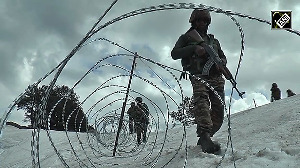Escape to Nowhere, the first work of fiction by a former spy, is based on how CIA mole Rabinder Singh fled the country on being discovered. The author, Amar Bhushan, told the book release event in New Delh on Monday evening that by the end of the book the reader will have answers to most questions about the incident. Priyanka reports
This is a story about the involvement of a senior analyst of an espionage agency," with these words Amar Bhushan, former special secretary with India's external intelligence agency Research and Analysis Wing, began to outline his work of fiction that is inspired by the true story of a Central Intelligence Agency mole in the high ranks of Research and Analysis Wing and his escape to the United States in 2004.
Escape to Nowhere is as close as can get to knowing what really happened in the case involving Rabinder Singh, Bhushan's former colleague, even though the book has been touted as a work of fiction -- the first such by a retired spy.
At the book release event in the capital on Monday evening, the author spoke about the plot -- how Rabinder Singh, joint secretary at R&AW, who was found to be working for the CIA, and was eventually able to slip into the US via Kathmandu, dodging a counter-intelligence hunt to nab him.
The book tells all this without giving out real names, and leaving much to one's imagination.
As if picking up a cue, even the speakers at the event -- internal security expert Ved Marwah and former head of R&AW's counter-terrorism division B Raman, senior journalist MR Narayan Swamy -- spoke of 'this' and 'that' agency and resisted mentioning the CIA, R&AW, the Intelligence Bureau or the US by name.
"Suspicious activities by the analysts are investigated for 96 days. During this period, a huge volume of evidence is gathered, but this is not considered sufficient by the head of security of the agency to comprehend the subject and charge for espionage," said Bhushan, outlining his book further.
"As the suspect's involvement becomes clear, panic sets in. The field investigator and chief of the agency press for the suspect's arrest by hook or by crook, and terminating the investigation. However, the head of security waits for crucial evidence to surface. The wait eventually takes an unexpected turn, and what happens thereafter is outrageous and bizarre.
"As the story comes to an end, readers have answers as to why the book has been entitled Escape to Nowhere," he said.
The author promises that all questions are answered by the end of the book. "By the end, you will find answers to many questions," he added.
"What was the crucial evidence that the head of security looking for? Why did the suspect double-cross the agency? Why were the safety vaults in the system so weak that the employees could easily get subverted and carry on espionage for years without being caught or suspected? What was the espionage module like, and finally, what happened to the suspect, his running officer, his investigators and collaborators?" he said.
Although it is clear that the book is based on an actual event -- although it doesn't tell you just how much of it is pure fiction and how much of it is based on facts -- Bhushan remains tightlipped. He explains his predicament thus: "The reason why I chose the medium of fiction to tell this story should be evident to you all."
"It clearly shows the fault lines in the Official Secrets Act, the Army Act and the Armed Forces Special Protection Act," said Bhushan. "These laws affect an open and honest debate to understand why events happen in a particular way."
"The perpetuation of these acts continues to deny historians access to the information that is gathering dust in the archives of various intelligence offices. It is preventing historians from writing objectively on events that shaped the nation at some point in time."
"I can see the difficulties the author facesto express what he wants to say," observed Marwah. "It is a gripping spy story, a critique of how an intelligence agency functions and a peep into how our political and administrative system is vulnerable."
Many argued that counter-intelligence operations still remain largely covert in the country. B Raman, a Rediff.com columnist, cautioned that for every known case of espionage, there might very well have been a few that went unnoticed.
"We don't discuss counter-intelligence failures and we don't know what kind of damage they (the perpetrators) could have done," he argued. "I feel there are a lot of weaknesses in counter-intelligence. Whatever we know is from non-government scholars."
Speaking on the real-life incident that inspired Bhushan's work of fiction, Raman said, "Till date, I don't think there has been a detailed inquiry to find out what went wrong. Unless we do that, how are we going to improve?"





 © 2025
© 2025